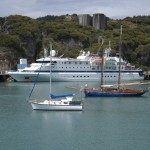– I don’t publish much that I tag as “Religion – The Right Way” but this piece will be one of those.
– I’ve attended the Unitarian Universalist Church a few times in my life and liked what I saw there. Most recently, I’ve gone to services here in Christchurch, New Zealand.
– The most recent time I attended, a paper written by a man named Peter Ferguson was read out and I really liked what was said. I asked for a copy and I’ve republished it here in its entirety.
– Conventional religions, for the most part, leave me cold. But this paper and what it expresses is, for me, of a higher quality. It’s worth reading and thinking about both as a statement of principles and as an historical analysis.
= = = = = = = = = = = = = = =
The Iron Bed of Procrustes
The Sacred Heresies of Unitarianism against the Iron Bed of Christian Orthodoxy
Peter Ferguson, 4 October 2009
Procrustes, the son of the sea god Poseidon, is a figure from Greek mythology. His stronghold was in the mountains. There he would offer travellers his hospitality, telling them about his magic bed that would adjust exactly to the size of the person who slept in it – no matter how tall or short. Once inside, however, Procrustes would force them onto the bed and make them fit it. If the guest was too tall, the legs would be amputated; if the victim was too short, he would stretch them out to fit. The Iron Bed of Procrustes has become a symbol of enforced conformity. The doctrine of conformity is central to the belief systems of both Christianity and Islam with the notable exception of Unitarianism.
Firstly, we shall look at the Procrustean demands of Christian orthodoxy which has its own iron beds in which all members have to fit.
Chances are that most of us are with the Unitarians because we couldn’t fit into the iron beds of the orthodox mainstream. We found Unitarianism a more attractive alternative where you are encouraged to form your own views about life. For example, to be an Anglican, a Catholic or a Baptist, you need to believe in the Trinity: That there is God the Father, God the Son and God the Holy Spirit. The Father sent his Son who had existed with him and the Holy Spirit from all eternity to planet Earth to be born of a virgin, to live a perfect life, die a sacrificial death, rise again two days later and ascend into heaven.
The Athanasian Creed remains in the very latest Anglican prayer book as the statement of faith, proclaiming that those who don’t believe in the Trinity will suffer punishment “in everlasting fire”. The Roman Catholic Church has given its followers even more impossible things that you have to believe in before breakfast every day: such as the infallibility of the Pope, and the bodily assumption to heaven of Jesus’ mother, Mary. If you disagree with the cardinal dogmas of the mainstream churches you will be labeled a heretic. The word heretic comes from the Greek “haeresis” meaning one who chooses.
Countless are the men and women who have been punished, banished and sometimes executed for not believing in the Three Person Godhead.
Peter Ferguson currently serves as president of ANZUUA. When he left the Anglican Church about ten years ago, his Archbishop wrote him a very nice letter thanking him for his contributions over the previous 40 years. Then came the sting in the tail of the Archbishop’s letter. He stated that if Peter abandoned his Unitarian belief, he would be welcome back in the Trinitarian fold.
For us heresy is sacred: choosing for ourselves is all about our rights as human beings. The mainstream churches regard Unitarianism as a cult. As proof of this Unitarian churches have consistently been denied membership to the World Council of Churches and their affiliated bodies around the world. A cult is a system of religious beliefs that replaces your beliefs with its own. A cult is a religious movement that gives legitimacy only to its own teachings. If you cannot or do not conform you are excluded. By this definition all the mainstream churches are cults: the Roman Catholic Church being the largest and most successful of them all. Each member has to conform and fit the denominational bed.
Secondly, we shall look at how all this came to be. To do this we need to have a look at the origins of Christianity. What follows is a very condensed overview of the history of the Early Church.
After the death of Jesus, his brother, James, became the leader of the group who had been Jesus’ followers. There are four clear references to James after Jesus’ death :
a) The Jewish historian Josephus, describing his sadness at the execution of James at the hands of the Sadducees in the year 62 CE, refers to James, as “the brother of Jesus called the Christ”.
b) In his letter to the Galatians 1:20, Paul, having visited Jerusalem, wrote “I only saw James, the brother of the Lord.”
c) In the Gospel of Mark 6:3 “This is the carpenter, surely, the son of Mary, the brother of James and Joses and Jude and Simon ? His sisters, too, are they not with us.”
d) The letter of James bears a striking similarity to Jesus’ Sermon on the Mount as it stresses the importance of Jesus’ ethical teaching rather than Paul’s Christ of faith. “My brothers! What good is it for a man to say, ‘I have faith’ if his actions do not prove it? Can that faith save him? Suppose there are brothers or sisters who need clothes and don’t have enough to eat. What good is there in your saying to them, ‘God bless you! Keep warm and eat well!” – if you don’t give them the necessities of life ? This is how it is with faith: if it is alone and has no actions with it, then it is dead. James 2:14-17.
After the death of Jesus, James and the original followers of Jesus continued to live in Jerusalem, still worshipping within the Temple and observing Judaism. In time they became known as the Ebionites, the Poor Ones. From the Book of the Acts, we read, “The many miracles and signs worked through the Apostles made a deep impression on everyone. The faithful all lived together and owned everything in common; they sold their goods and possessions and shared out the proceeds among themselves according to what each one needed. They went as a body to the Temple every day but met in their houses for the breaking of bread: they shared their food gladly and generously; they praised God and were looked up to by everyone.” Very soon, however, the situation was to change and within a few short years the belief that Jesus had risen from the dead spread rapidly and gained followers from across the Roman Empire: proof of this being Nero’s blaming the Christians for the great fire of Rome in 64CE.
Paul arrived on the scene after a dramatic visionary encounter with Jesus on the Damascus Road. He soon redefined the life and person of Jesus. It is interesting to note that Paul came from Tarsus which was a centre for the worship of Heracles. The similarities of Paul’s Christ and the Greek demigod are truly amazing. Heracles was the son of Zeus and the virgin, Alcmene. He was of royal lineage and destined to rule the world. He gathered around him followers and performed extraordinary feats and miracles. He suffered a cruel death and descended into the underworld. He rose again and ascended into heaven. His disciples looked forward to his return in glory.
Many scholars believe that Paul’s Christ was a product and amalgam of various figures from Greek mythology including Mithras, Dionysus and Isis. Paul saw Jesus’ death as part of a divine plan and referred to Jesus as Jesus Christ as if Christ was his surname. Paul made it easy for his converts to become Christians and permitted them to discard practices such as circumcision and eating of pork and other unclean animals even though during the Maccabean wars thousands of Jews died to defend those two particular laws of the Torah. Time does not permit us to go deeper. Suffice to state that Paul was engaged in bitter rows with the original Jewish disciples for the rest of his life.
For its first 300 years the Church was anything but a monolithic unity. The proliferation of Christian groups was a mind blowing phenomenon in the first three centuries. The proto-orthodox Paulinist Catholic Church was the largest. The Ebionites rejected the virgin birth and the pre-existence of Jesus and stressed the humanity of Jesus and the essential oneness of God. The Docetists believed that Jesus was a heavenly being. The Montanists practiced speaking in tongues. Marcionites appointed women as bishops and priests. Carpocratians enjoyed good food and wine and taught that Jesus had a normal parentage.
They endured several severe persecutions from various Roman emperors till the early years of the 4th century. In 312, on the eve of battle, the Emperor Constantine had a dream that was to change the course of history forever. He saw a sign in the sky with the words “Hoc signo victor eris” which translates as “By this sign you shall be the victor”. He saw it as a good omen and he gave orders that this Christian sign, the letters “Chi Rho”, be painted on every soldier’s shield.
Constantine’s army triumphed at the battle of the Milvian Bridge and thus captured Rome and became sole emperor. Constantine immediately introduced religious toleration to all the religions of the Empire but gave special favours to the Christians.
In a shrewd move motivated by politics and military strategy, Constantine then called a meeting of the various Christian leaders in his Empire. Contrary to common belief the Christians at that time had no centralized leadership. There was no one Pope ruling the Christian world. A meeting took place in Nicaea, modern day Turkey, where Constantine had his palace. Delegates came from every part of the Empire. One of the main purposes of the gathering was to decide whether Jesus had been God from all eternity or simply a divine being. Constantine, who was not a Christian, presided over the Council and ruled in favour of those who believed that Jesus Christ was of one substance with the Father – God the Son.
Those who refused to consent were banished. The rest of the delegates were invited to stay on and attend Constantine’s 20th anniversary celebrations. Several of the signatories wrote to Constantine afterwards. Eusebius of Nicomedia wrote to Constantine stating, “We committed an impious act, O Prince, by subscribing to a blasphemy for fear of you.” But it was too late and there was no turning back on the decisions of the Council of Nicaea.
Jesus, the Jewish teacher, had been declared truly God from all eternity.
For Constantine, it was probably a matter of no great importance: after all he had his own father, Constantius, deified. He, himself, would be deified after his death. Was Constantine a true follower of Jesus? Judge for yourself. A year after Nicaea, Constantine ordered the execution of his son, and then instructed that his wife be boiled alive while taking a bath – surely a far cry from the teachings of the carpenter from Nazareth. Constantine, however, was baptized on his deathbed to ensure that all his sins would be forgiven and that he would gain immediate entrance into heaven!
It proved to be a conclusive victory for the Paulinist proto-orthodox party and to this day the Nicene Creed remains the central doctrine of the Catholic, Orthodox and Protestant churches.
Within a hundred years of so after Nicaea the many varieties of Christianity had been consigned to the rubbish bin of history. Gone were the Ebionites, the Gnostics, the Carpocratians – the whole lot ! The Church closed down the centres of Greek philosophy – the famous schools of Plato, the Aristotelians, the Stoics, the Skeptics, the Epicurians and the Hedonists – all gone ! The temples of the pagan gods and goddesses of the mystery religions, Isis, Mithras, Venus were all rooted out of existence by the triumphant Constantinian Trinitarian Church. The dark ages of Procrustean conformity lasted for more than a thousand years.
The now dominant Catholic Church supported by the power of the Roman State promptly set about imposing its doctrines upon the citizens of the Empire. The Jewish communities were one of the first targets. Heavy penalties were imposed upon anyone who converted to Judaism. Mixed marriages were punished by death. In the next century their synagogues were confiscated and converted into churches. Forced expulsions, pogroms and other atrocities were leveled at the Jewish communities throughout the years and culminated in the Holocaust.
The Church came down heavily on any deviation from the teachings of the Roman hierarchy. The tri-theistic doctrine of the Trinity was not seriously challenged until the Enlightenment and Renaissance.
Now for the story of Michael Servetus who was born Miguel Serveto on St Michael’s Day 29 September 1511 in Aragon in north east Spain. A child prodigy by the age of 13 he could read French, Greek, Latin and most significantly Hebrew which was considered dangerous and subversive by the church. For Servetus, the Trinity was a contrived teaching and Christianity could never be purified until it was stripped away. As long as the Trinity was its central teaching, any outreach to the Jews and Muslims who were monotheists would be futile. He had a dream of the Christian Jews and Muslims being as it were “under one umbrella”.
He decided to write a book “On the Errors of the Trinity”. He was a teenager 19 years old at the time. The book was a sell-out – 1000 copies sold immediately and it became a best seller. However, he had become a marked man both to the Inquisition and the Protestant reformers. Like Salmon Rushdie, Servetus was soon to discover that underestimating one’s religious opponents can be very dangerous. He was sentenced to death in absentia by the Spanish Inquisition.
Not only the Catholics but the Protestant reformer Calvin were now equally furious. Servetus wisely changed his name and identity and studied in mathematics and medicine at the University of Paris under the name of Michael Villeneuve. A brilliant mind he described the pulmonary system of the blood 75 years before the British physician, William Harvey, made the same observation. Harvey was accredited with the discovery but actually it had been Michael Servetus.
In 1553 his cover as Dr Villeneuve was blown and he fled from the Inquisition to Geneva, ruled over by Calvin, arriving there on Saturday 12 August staying at a safe place in the Inn of the Rose. The following day he attended church and was recognized and arrested and thrown into a lice-infested cell. At his trial Servetus bravely defended his belief in the absolute unity of God.
The obedient lackeys of Calvin were unanimous in their condemnation of him. And so on 27 October 1553 at the age of 42 Michael Servetus was led to the stake, an iron chain wrapped around his torso and a thick rope wound several times about his neck. A crown of thorns and leaves filled with sulphur was placed upon his head, and his book “The Errors of the Trinity” were lashed to his arm. Green wood was placed around the stake to ensure his death would be slow. The fire was lit. It took him half an hour to die. He did not break down and was heard to say, “Oh, Jesus, son of the Eternal God, have pity on me.” So even in death he had remained true to his faith otherwise he would have said, “Oh Jesus eternal Son of God …”
Thirdly, we look at the history of the defamation and suppression of women by the Church. It has its roots in the New Testament.
In 1 Timothy 2:11, we read “Let a woman learn in silence with complete submission. I permit no woman to teach or have authority over a man. She is to keep silent for Adam was created first then Eve. And Adam was not deceived but the woman was deceived and became a transgressor. Yet she shall be saved through childbearing.” Saint Jerome (c. 347 – 420) who was responsible for the Latin translation of the Bible, described women in these words, “… the gate of the devil, the way of evil, the sting of the scorpion, in a word, a very dangerous thing.” Much later St Thomas Aquinas (c.1225-1274) described woman as a “failed man”. “Woman was created to help man but only in procreation. She should not be permitted any equality in the Church or civil society.”
The suppression of women reached a horrifying climax in the witch hunts which resulted in several million women being tortured and tens of thousands being burnt at the stake from the 13th to the 18th century. Martin Luther (1483-1546) claimed that the man was the lord and master of his wife and had the right to beat her. “If they become tired or even die, that does not matter. Let them die in childbirth – that is why they are there.”
As we enter the 21st century women are still being debarred from ordination in about 90% of Christendom. Recently the Pope placed a ban on any discussion about the ordination of women to the Catholic priesthood. Conservative Christians, Catholic and Protestant also oppose pro-choice legislation and a woman’s right to have control over her own body. Both Islamists and the Catholic Church ban the use of contraception in a world where over-population is a major issue.
There is an astonishing similarity between conservative Christians and Islamists and the fact that they share the same detestation for liberal values. One of the reasons why ayatollahs and imams from around the world have called upon their followers to wage jihad was because the liberal and permissive values of the USA and the West were seen as a threat to Islam and undermining the faith that was brought to them through the prophet Mohammed. These are some of the things that both Islamists and conservative Christians, both Protestant and Catholic, abhor :
– the emphasis on individual freedoms
– the laws that have given women equal rights in our society
– liberated women and all that symbolizes them.
– the fact that women should have the right to decide whether they will have children.
– homosexuality and gay and lesbian lifestyles
Both groups claim for their authority the infallible Word of God – the Bible or the Koran.
Summing up, as we reflect on the religious practices and beliefs of our own times, scholars have noted the fact that conservative Christians and Islamists share the same prejudices. Scholars are beginning to understand that nearly all of the leaders of these groups are alpha males who are simply defining the boundaries of their territories. These are perfectly normal and natural behaviours which they share with all sexually territorial animals. The males set and enforce the rules, the females obey the rules and raise the children.
When the Pope or the Aytollah state that they are simply following the word of God or Allah, they are actually seriously underestimating the weight of their position. The real authority behind this way of behaviour is millions of years older than all the religions and all the concocted gods and goddesses that there has ever been.
This form of behaviour, however, is completely unsuited for the world that we now live in. It’s the recipe for destruction. It was fine when we first came out of the trees, walked on two legs and lived in small groups. In our contemporary world natural alpha male behaviour is incapable of the flexibility needed to structure human societies in a humane way. It is too small to do justice to the complexities of the 21st century.
The iron bed of alpha male orthodoxy is not a comfortable resting place for free thinkers and those who think outside the square. We are fortunate to be living in an age when we are no longer forced to believe irrational ideas. It’s much better to be a free spirit.
We are mortal and we don’t know if anything awaits us after death and so we should see life as a wonderful source of joy as we live each moment. At the same time we serve humanity and dream of trying to make the world a better place for ourselves and others including those who are not human. The ideal of our faith community is to provide an atmosphere of freedom. We are at our very best when we provide an environment where it is safe to voice one’s beliefs whether religious, moral, social or political. One is not made to feel a second class person or a candidate for hell and damnation if one’s views and ideas are not mainstream.
We freely admit that we don’t have the answers or even the right questions to all of life’s problems. Our vocation is to live ethically, to show true concern for those around us, keeping in mind always the fact of the transience of our own lives, and our friends and loved ones. We should practice kindness.
As free thinkers we are the final arbiters of what is good and evil. Sam Harris puts it very well,
“The only angels we need to invoke are those of our better nature: reason, honesty and love. The only demons we must fear are those that lurk inside every human mind: ignorance, greed, and blind faith which is surely the devil’s masterpiece.”
– My thanks to John A. of the Unitarian Universalists of Christchurch, New Zealand for both reading out this paper and for sharing a copy with me.

































